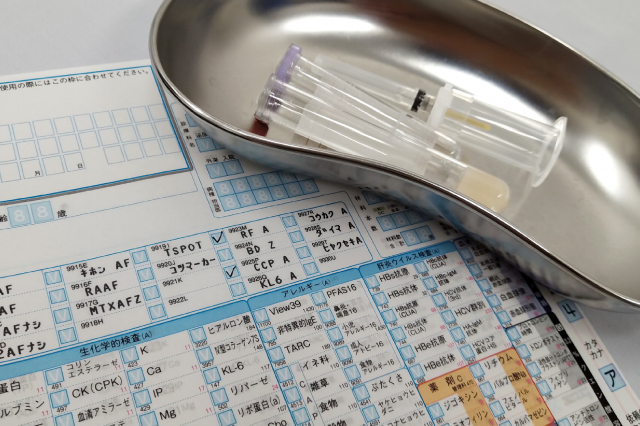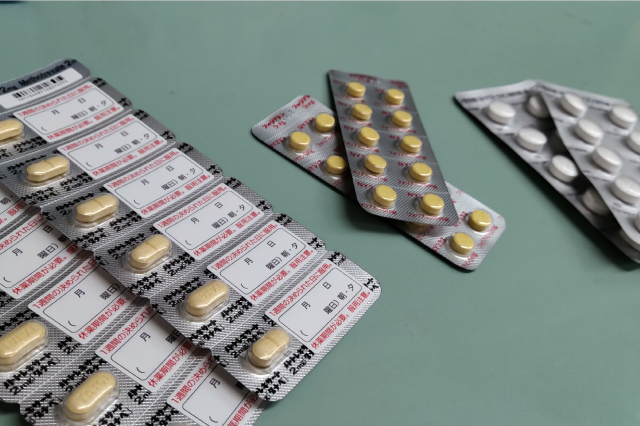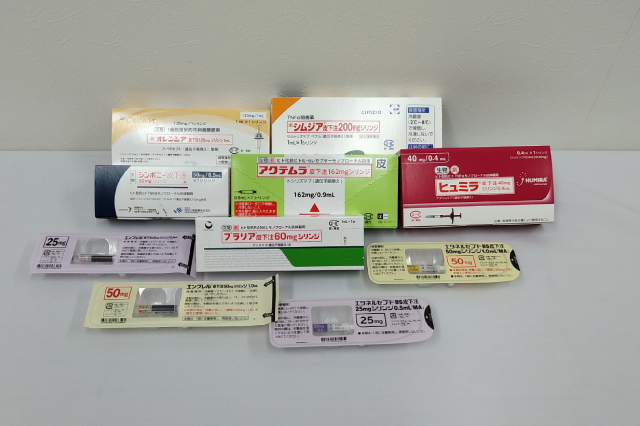MTX and folic acid play an important role in the treatment of RA
MTX is a central drug in the treatment of rheumatism
MTX:(methotrexate, methotrexate, rheumatrex, methotrexate)
With a content of 2mg per capsule, it is the most reliable and effective anti-rheumatic drug.
MTX is now the first choice of anti-rheumatic drugs worldwide.
Dosage of MTX
I prescribe it to most patients, except for those with very mild rheumatism, strong liver damage, pulmonary disease, and those who are considering pregnancy.
This drug has been used as an anti-cancer drug for a long time, but it works very well when administered only once or twice a week at about 1/100th of the dose used as an anti-cancer drug.
The first dose is 4mg-8mg (2-4 capsules) per week on a fixed day of the week, and the dose is increased over several months until it becomes effective (about 20mg for men and 16mg for women).
The effect is usually seen within a month or two of starting the drug.
In Japan, the maximum dosage was set at 8mg (=4 capsules) per week.
This was revised in 2011 and up to 16mg/week is now allowed.
In Western and Asian countries other than Japan, up to 25mg (10-12 capsules of Rheumatrex) has been used if necessary.
In recent years, more and more facilities seem to be administering up to 30mg-40mg.
There were many patients whose rheumatism progressed because of the limited dosage, although they would have improved if they used a sufficient amount.
With the revision of the package insert, rheumatologists in Japan will gradually become accustomed to administering more than 12mg, and the excessive fear of side effects will disappear.
In the outpatient rheumatology clinic, I have been responsible for prescribing the most appropriate dosage for each patient for many years.
The appropriate dosage is the one that gives the maximum effect without strong side effects.
The goal of rheumatoid arthritis control is, to some extent, measured by the blood count CRP, which indicates the intensity of inflammation.
However, symptoms are much more important than the test numbers.
Treatment with the goal of remission
- No swelling of the joints, only occasional light pain.
- Able to do household chores, sports such as jogging, tennis, and golf, and travel and hike in the mountains as well as normal people.
This is the target line of treatment that we are aiming for in the first place.
The technical term "remission" can be used. Therefore, if rheumatic pain and swelling persist, the MTX dose is increased even if the CRP is low. Of course, if strong side effects occur, that will be the upper limit of the MTX dose. Of course, if strong side effects occur, the MTX dose will be capped. You can rest assured.
Side effects of MTX
It has rather fewer side effects than the most commonly used anti-rheumatic drugs to date, such as Ciozol.
However, dangerous side effects such as interstitial pneumonia (white lung on x-ray) and leukopenia occur rarely, so caution is needed. However, these side effects are not serious as long as you take the correct dosage, keep a check on it, and take care of it as soon as possible.
A chest x-ray should be done before starting the drug.
A blood test will be done 3 to 4 weeks after the start of administration to check for side effects and to see how the CRP is dropping. Once the patient has stabilized, blood collection will be reduced to every 1-2 months.
If you experience any symptoms such as cough, fever, breathlessness, or severe general malaise, do not wait until your next doctor's appointment, but visit your doctor immediately for a chest x-ray and blood test.
Other common side effects include gastrointestinal problems, mouth ulcers, dry cough, irritation of the throat and other mucous membranes, difficulty breathing, fatigue, easy hair loss when washing hair, easy internal bleeding, difficulty stopping menstrual bleeding, and increased liver function numbers.
On the other hand, these side effects can also be a sign that the drug is working well in the body (well-concentrated), so there is no need to worry too much about them if they are minor.
About Folic Acid (Foliamine)
To reduce side effects, we ask patients to take a vitamin called folic acid (brand name Foliamine), which reduces the anti-rheumatic effect when taken together with MTX. In our clinic, we ask patients to take two tablets on the Monday after the Saturday or Sunday when they take MTX.
If you are taking MTX for the first time, take Foliamine the day before.
For patients who are taking MTX for the first time, it is important for them to get used to taking MTX rather than its anti-rheumatic effect, so I always explain that they should take Foliamine the day before taking MTX.
How to take MTX
Patients in this hospital are instructed to take it all at once on Saturday and Sunday mornings. Please note that this is a little different from the way it is written in the attached document.
If you have a good understanding of the nature of the medication, you can arrange the way of taking it slightly to suit your individual needs, as follows.
You may change the day of the week when you are less likely to forget to take it.
What if I forget to take my medicine?
The days of the week are not strict, so if you forget to take it, you can just take it the next day.
You can take it the next day if you forget.
Although it is stated to be taken after breakfast, it can be taken after breakfast, lunch, and dinner, either in one dose or in two.
Evidence literature
●MTX Pneumonia-Hitoshi Tokuda Rheumatoid Arthritis Vol. 42, No. 5: 516-224. 2009/11 Special Feature The latest findings for the effective and safe use of methotrexate
●Methotrexate pharmacokinetics and drug interactions-Shunsuke Mori Rheumatoid Arthritis Vol. 42, No. 5: 471-479. 2009/1
Rheumatoid arthritis Q & A regarding the use of methotrexate
We answer many questions about taking methotrexate (MTX). I hope it will be an opportunity for patients who start RA treatment using MTX to deepen their understanding.
- (While visiting another hospital) I was using MTX and it worked well, but I continued to have a dry cough, so I took an X-ray of my chest. There was no abnormality, but it was canceled due to the risk of interstitial pneumonia.
- There are many side effects of MTX, but the key word to explain this is mucosal damage. This explains many side effects such as gastrointestinal disorders, mouth ulcers, cheilitis, and bleeding from the vaginal mucosa. Since the throat (pharynx and larynx) does not leak and the surface is mucous membrane, complaints such as difficulty in swallowing, tingling, and dry cough are seen from beginning to end. Immediately, without panicking for pneumonia, if chest x-rays and blood tests show that pneumonia is unlikely, you should add it if you are not taking folic acid, and if the symptoms are not severe, follow the course with symptomatic treatment.
- I started taking MTX, but on the first day I took it, I felt sick and felt like I was going back. I heard that it was a strong drug, so I was scared and stopped. When I consulted with my teacher, I was told that it didn't suit you, so I decided to cancel. Instead, I'm using a lighter drug with fewer side effects, but rheumatism seems to be getting worse and worse after that. When I started using MTX, I stopped using it because my blood test after 4 weeks told me that my liver function was increasing. After all RA is getting worse.
- When using MTX, it is strongly recommended to always use folic acid together from the beginning. Folic acid, a vitamin, is often deficient even in healthy people, and when MTX is administered to it, gastrointestinal disorders and liver dysfunction occur at a high rate. Once you feel uncomfortable, the patient has a strong sense of fear that it is a strong drug, and often stops it. MTX is a drug that is far more effective than other drugs. If you give up using MTX, you may take away your chances of getting rid of RA.
- What is the difference between MTX (Rheumatrex and Methotrexate)?
- Since Rheumatrex is a capsule, it is absorbed in the gastrointestinal tract at a lower rate in some people than in tablets of methotrexate, and in some cases it is less effective. For this reason, most patients at our hospital use tablets of methotrexate. On the other hand, methotrexate is prone to gastrointestinal disorders, so some patients desire rheumatrex.









